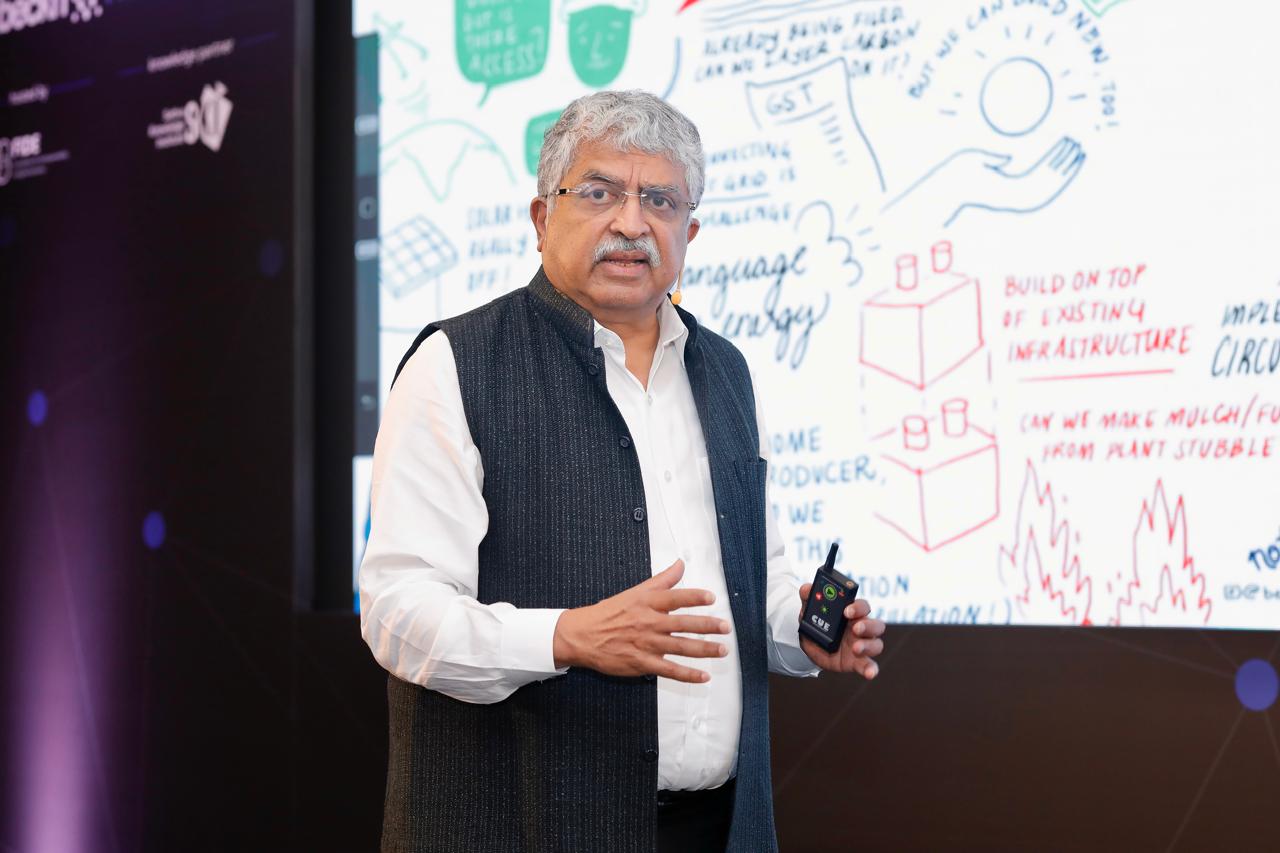Coordination costs can be reduced through Open Networks
Bengaluru, NFAPost: The common consensus at the inaugural edition of Beckn Node Zero 2024 organised by FIDE along with knowledge partner Sattva Knowledge Institute, held in Bengaluru, which brought together thought leaders and industry experts to discuss India’s role in addressing the global climate crisis was the fact that India is ready to provide climate action solutions for the world.
The event also echoed the sentiment that India, while reducing its own climate impact can contribute significantly to global climate solutions by harnessing the power of technology, open networks and fostering collaborative partnerships for a more sustainable future.
Delivering the keynote address, Infosys Non-Executive Chairman and FIDE Cofounder Nandan Nilekani said the world has moved to execution mode in tackling the global climate crisis and it is time for India to step up its efforts for the same.
“Climate is time bound, and we need to act with exponential scale and pace. India has dealt with complexity at scale and speed with digital infrastructure and we can now solve problems for the world. We need to harness existing digital infrastructure to layer new solutions. Behavioural change in climate action is linked to financial incentives,” said Infosys Non-Executive Chairman and FIDE Cofounder Nandan Nilekani.
He said India has the largest Direct Benefit Transfer infrastructure in the world, and it is time to reuse this for climate action payments.
“The other big idea that is work in progress, is what we call ‘Finternet’, which is how you create tokenisation of assets, and we think that is a big part of changing the financial system. We believe that the idea of Beckn which is decentralised transactions infrastructure and the idea of Finternet, which is decentralised assets infrastructure can come together. We have the technology, capability, and the ability to make this work and will see examples of this in the coming year,” said Infosys Non-Executive Chairman and FIDE Cofounder Nandan Nilekani.
Infosys Non-Executive Chairman and FIDE Cofounder Nandan Nilekani also pointed out that India has enough data to predict extreme events.
“Data is not the problem but how to make it accessible is the issue, due to high coordination costs. This can be solved by open networks, which will bring down the cost of coordination. Similarly with regard to circular economy, only 7% is recycled. Here again there is a problem of coordination, which can be solved through open networks,” added Infosys Non-Executive Chairman and FIDE Cofounder Nandan Nilekani.
The second day witnessed a panel discussion moderated by Sanjay Purohit, CEO and Chief Curator, Centre for Exponential Change, that deliberated on whether India’s technical readiness commensurate to the narrative that we are holding that building open networks is straightforward and simple and whether they can really open up the potential of the ecosystem. Panellists underlined the need to properly understand the context for solutions.
Speaking at the inaugural of Beckn Node Zero, FIDE Cofounder Dr. Pramod Varma said open networks have the potential to revolutionize the way India addresses climate challenges by fostering collaboration, transparency, and efficiency.
“Two issues that we are facing in climate action is that much of our everyday activity has an impact on climate change and the value of nature is not included in the economy of growth. The question that we need to ask ourselves is: who will solve this multi-dimensional complex issue? We need to change our thinking in the direction of a new sustainable economy, with a network approach with coordination as the focal point.
He also reminded the need to look at dramatically reducing the cost of coordination. If every individual node in that network can do one thing well, FIDE Cofounder Dr. Pramod Varma said it will result in collective exponential change.
“Today’s problems were yesterday’s solutions; therefore, solution thinking requires problem understanding. We need to restart, reimagine and move to new age networks that is fundamentally designed on a user centric architecture rather than a system centric one to create the early move to demonstrate high trust, low-cost networks,” said FIDE Cofounder Dr. Pramod Varma.
FIDE CEO and Co-Founder Sujith Nair said Beckn Node Zero is that space for thinkers, solvers, investors, community representatives, farmers etc. to listen, learn, contribute and experience the manifestation of open networks.
“The event provided a platform for stakeholders to come together and explore how open networks can accelerate climate action. We believe that we have achieved the aim of this conference by way of multiple engagements to frame the question of whether open networks is one of the ways for a coordinated action with a humanity centric design,” said FIDE CEO and Co-Founder Sujith Nair.
Beckn Node Zero will be conducted as a flagship event of FIDE on an annual basis and will continue to play a pivotal role in shaping the country’s trajectory and inspiring global initiatives.
About FIDE: The Foundation for Interoperability in Digital Economy (FIDE) is the genesis author of the Beckn Protocol specification and the key donor supporting its development. FIDE continues to champion an open, community-led movement around Beckn. As a not-for-profit organisation, FIDE promotes innovation and collaboration among ecosystem participants by creating interoperable open protocol specifications as a public good. The Beckn Protocol, whichis open-source, allows the ecosystem to freely adopt it to build digital infrastructure for the public good. Through these open protocols, the goal is to enable any service to operate seamlessly within a Beckn-enabled networks like ONDC, Unified Energy Interface, offering everyone an integrated digital commerce experience.
About Sattva Knowledge Institute : Sattva Knowledge Institute (SKI), established in 2022, is our official knowledge platform at Sattva. The SKI platform aims to guide investment decisions for impact, shedding light on urgent problems and high potential solutions, so that stakeholders can build greater awareness and a bias towards concerted action. Our focus is on offering solutions over symptoms, carefully curating strong evidence-based research, and engaging decision-makers actively with our insights. Overall, SKI aims to shift intent and action toward greater impact by influencing leaders with knowledge. All our content proactively leverages the capabilities, experience and proprietary data from across Sattva.–





